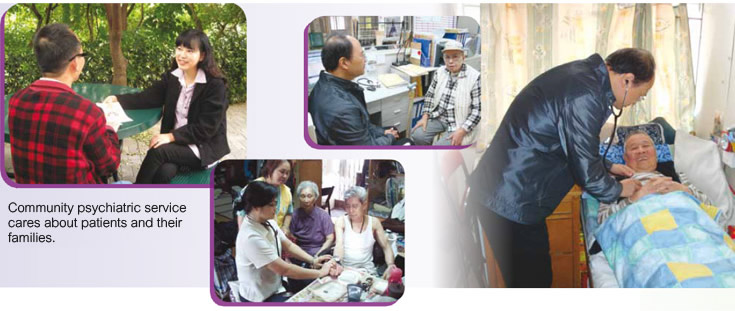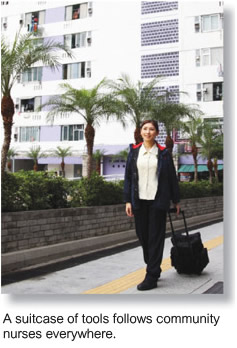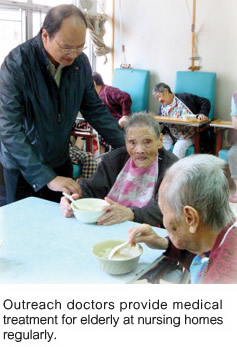


|
||||||||||||
|
Medical outreach services are far more than visiting patients by healthcare personnel. The idea of the services is to understand thoroughly the needs and recovery status of patients via regular contacts among healthcare workers, patients and carers. Healthcare professionals therefore can devise the most suitable treatment plan. Outreach services help enhance health awareness among patients and carers and, more importantly, allow patients to recuperate in a familiar environment. The Hospital Authority's community outreach services involve collaborations among nurses, doctors and allied health practitioners. They provide holistic care for elderly patients in nursing homes, psychiatric patients, and those who are chronically ill. Doctors entrusted with this task will make regular visits to nursing homes to assess the conditions of patients and provide diagnoses and treatments as needed. Dr Kong Tak-kwan, Cluster Clinical Coordinator (Community Geriatrics) for Kowloon West Cluster pointed out that, placing patients in an environment familiar to themselves not only allows doctors and nurses gain a better understanding of the living environment, but also helps facilitate communication with their families, which are critical to treatments for the patients. Lam Yin-ming, nurse specialist of community nurse service, Princess Margaret Hospital, recalled a case in which a patient's wound showed very little improvement in spite of prolonged treatment. After talking with the patient, Lam found that the patient suffered from depression and lost her appetite as she was struggling in her marriage, which led to malnutrition and poor immune system. This reflects the important role played by community nurses in contributing to total recovery of a patient. |
||||||||||||
|
|
||||||||||||
|
Outreach work is no easy task. The community nurses, for example, have to carry various instruments and equipment to patients' homes during every outing. For those confined with complicated health problems, the service can easily last over an hour. As every treatment demands tremendous care and effort, it is easy for outreach staff to form bonds with patients through close connections. Lam Yin-ming cares a lot about her patients, she said: "When typhoon signal is hoisted, the first thing in my mind is always my patients." Subsequently, she will be deeply saddened if any of her patients refuses to change their lifestyle to improve health, thus missing opportunities to recover. Care and kindness is reciprocating. Dr Kong Tak-kwan's care for patients has won the same from his patients when his father passed away six years ago. He recalled that a patient telephoned him after learning the news. "At that moment he didn't really say much, he just cried. But I was truly grateful for his condolences and concern," said Dr Kong. In addition to caring for patients, community services also cater to the needs of patients' families. Offspring of patients with psychiatric illnesses might sometimes feel averse to or become hostile towards their sick parents. To repair relations, Jolene Mui Hang-chun and her team take the initiative to arrange regular activities for these children, encouraging them to share their experiences with others of the same plight. She said: "It helps improve harmony in the family and benefit patient recovery when children can accept their parents again. Through community services, we can serve the whole family." |
| |||||||||||
|
The pilot nurse-led community clinics were set up by the Hospital Authority to promote the concept of "hospital without walls". HA will continue to strengthen specialised nursing services and integrate community resources in a bid to provide patients with holistic service. Another focus of the community clinic is engaging patients. The community psychiatric team has invited recovered patients to become "peer recovery support specialists". It is expected that through sharing personal recuperation experiences and exchanging feelings as a service user, patients and healthcare personnel can come closer in the fight against diseases, and service quality can be further enhanced.
|
|
|||||||||||
| |
|
|
|
|
||||||||


